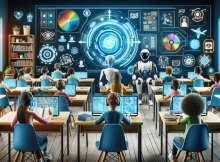In the ever-evolving landscape of technology, Artificial Intelligence (AI) stands out as a revolutionary force, especially in the realm of education. This article delves into the transformative role of AI in shaping future education systems, offering a glimpse into a world where learning is more personalized, efficient, and accessible.
AI in Education: A Game Changer
The Emergence of AI-Driven Learning
AI’s integration into education marks a significant shift from traditional teaching methods. AI-powered tools and platforms are providing personalized learning experiences, adapting to each student’s unique needs and pace.
Revolutionizing Classroom Interactions
AI is not just about automation; it’s about enhancing the interaction between teachers and students. AI tools can assist teachers in grading, giving them more time to focus on student engagement and creative teaching methods.
Personalized Learning: Tailoring Education to Individual Needs
Adaptive Learning Technologies
One of the most significant advantages of AI in education is its ability to create adaptive learning environments. These technologies analyze students’ learning patterns and tailor the content to suit their learning styles and paces.
Bridging Learning Gaps
AI helps in identifying areas where students are struggling, allowing for timely intervention. This ensures that learning gaps are addressed promptly, leading to better educational outcomes.
Enhancing Access and Inclusivity
Breaking Geographical Barriers
AI-powered online learning platforms have made education accessible to a wider audience, breaking geographical barriers. This inclusivity is pivotal in democratizing education globally.
Supporting Diverse Learning Needs
AI tools are instrumental in supporting students with special needs. Customizable learning environments cater to a wide range of learning abilities, ensuring that no student is left behind.
The Future of Assessments and Feedback
AI in Evaluations
AI is revolutionizing the way assessments are conducted. Automated grading systems and AI-driven analytics provide more objective and timely evaluations of student performance.
Real-Time Feedback
AI systems can offer real-time feedback to students, helping them understand their strengths and areas for improvement instantly, leading to more effective learning.
Conclusion
The integration of Artificial Intelligence into education systems is not just a trend; it’s the future. As AI continues to evolve, so will how we teach and learn. Embracing AI in education means opening doors to a world of personalized, accessible, and effective learning experiences. The future of education is here, and it’s powered by AI.
To sharpen your knowledge with the latest educational innovations, save your slot: https://educationconference.co/

